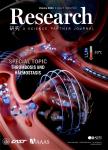Human Placental Mesenchymal Stem Cells Relieve Primary Sclerosing Cholangitis via Upregulation of TGR5 in Mdr2^(-/-)Mice and Human Intrahepatic Cholangiocyte Organoid Models
作者机构:State Key Laboratory for the Diagnosis and Treatment of Infectious DiseasesCllaborative Innovation Center for Diagnosis and Treatment of Infectious DiseasesThe First Affliated HospitalZhejang University School of Medicine79 Qingchun Rd.Hangzhou 310003China National Clinical Research Center for Infectious DiseasesHangzhouChina Key Laboratory of Diagnosis and Treatment of Aging and Physic-chemical Injury Diseases of Zhejiang Province79 Qingchun Rd.Hangzhou 310003China Jjinan Microecological Biomedicine Shandong LaboratoryJinan 250117China
出 版 物:《Research》 (研究(英文))
年 卷 期:2024年第2023卷第2期
页 面:355-372页
核心收录:
学科分类:1002[医学-临床医学] 100210[医学-外科学(含:普外、骨外、泌尿外、胸心外、神外、整形、烧伤、野战外)] 10[医学]
基 金:supported by the National Key Research and Development Program of China(No.2020YFA0113003) the Key Research and Development Project of Zhejiang Province(No.2023C03046) the Fundamental Research Funds for the Central Universities(No.2022ZFJH003) the Research Project of Jinan Microecological Biomedicine Shandong Laboratory(Nos.JNL-2022026C and JNL-2023003C)
主 题:inflammation TGR5 Human
摘 要:Primary sclerosing cholangitis(PSC)is a biliary disease accompanied by chronic inflammation of the liver and biliary *** stem cells(MSCs)are used to treat liver diseases because of their immune regulation and regeneration-promoting *** study was performed to explore the therapeutic potential of human placental MSCs(hP-MSCs)in PSC through the Takeda G protein-coupled receptor 5(TGR5)receptor *** tissues were collected from patients with PSC and healthy donors(n=4)for RNA sequencing and intrahepatic cholangiocyte organoid ***-MSCs were injected via the tail vein into Mdr2^(-/-),bile duct ligation(BDL),and 3,5-diethoxycarbonyl-1,4-dihydrocollidine(DDC)mouse models or co-cultured with organoids to confirm their therapeutic effect on biliary *** in bile acid metabolic profile were analyzed by liquid chromatography/tandem mass spectrometry(LC-MS/MS).Compared with healthy controls,liver tissues and intrahepatic cholangiocyte organoids from PSC patients were characterized by inflammation and cholestasis,and marked downregulation of bile acid receptor TGR5 ***-MSC treatment apparently reduced the inflammation,cholestasis,and fibrosis in Mdr2^(-/-),BDL,and DDC model *** activating the phosphatidylinositol 3 kinase/extracellular signal-regulated protein kinase pathway,hP-MSC treatment promoted the proliferation of cholangiocytes,and affected the transcription of downstream nuclear factorκB through regulation of the binding of TGR5 and Pellino3,thereby affecting the cholangiocyte inflammatory phenotype.



